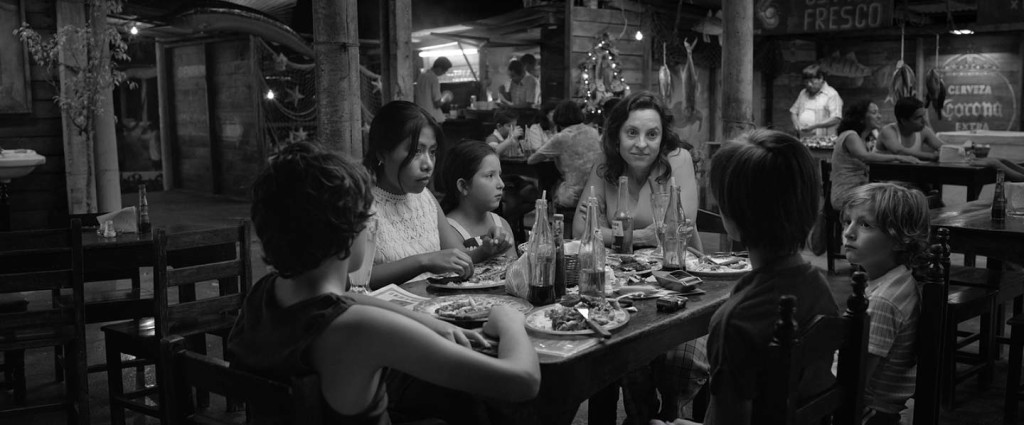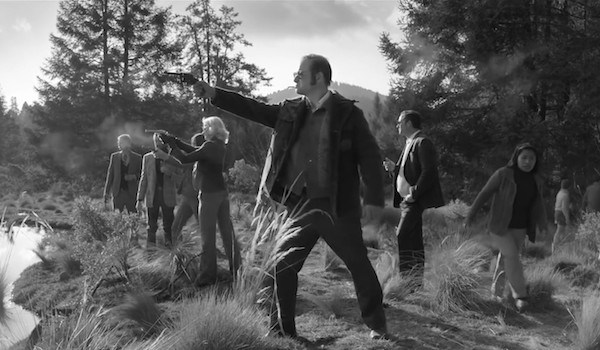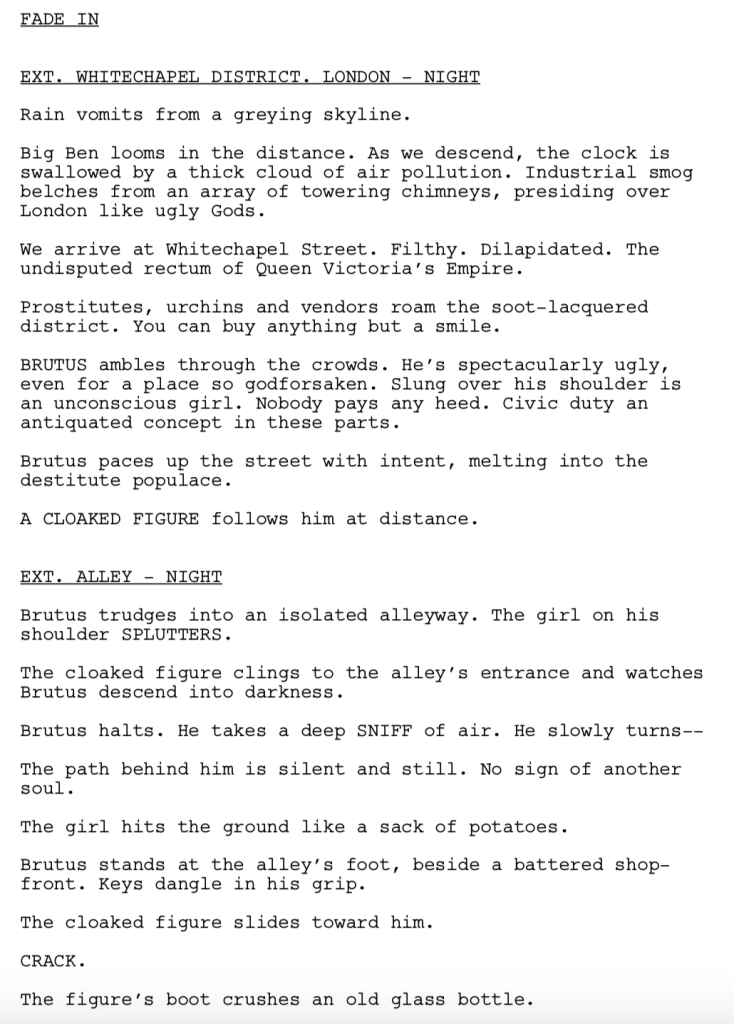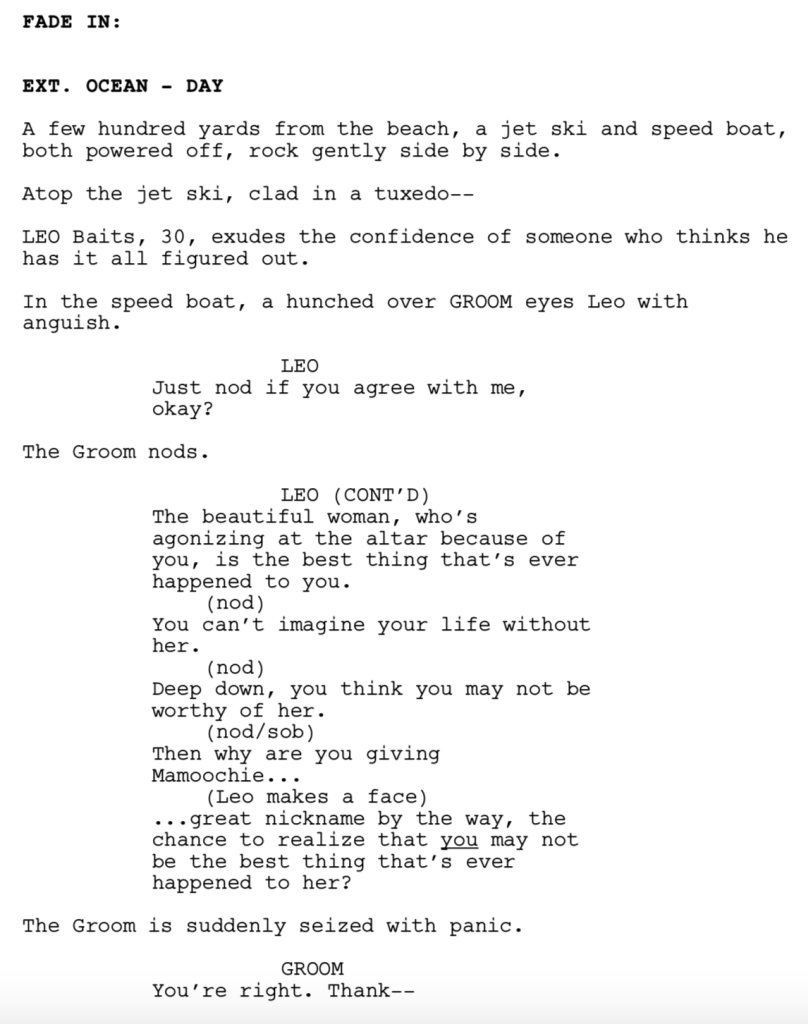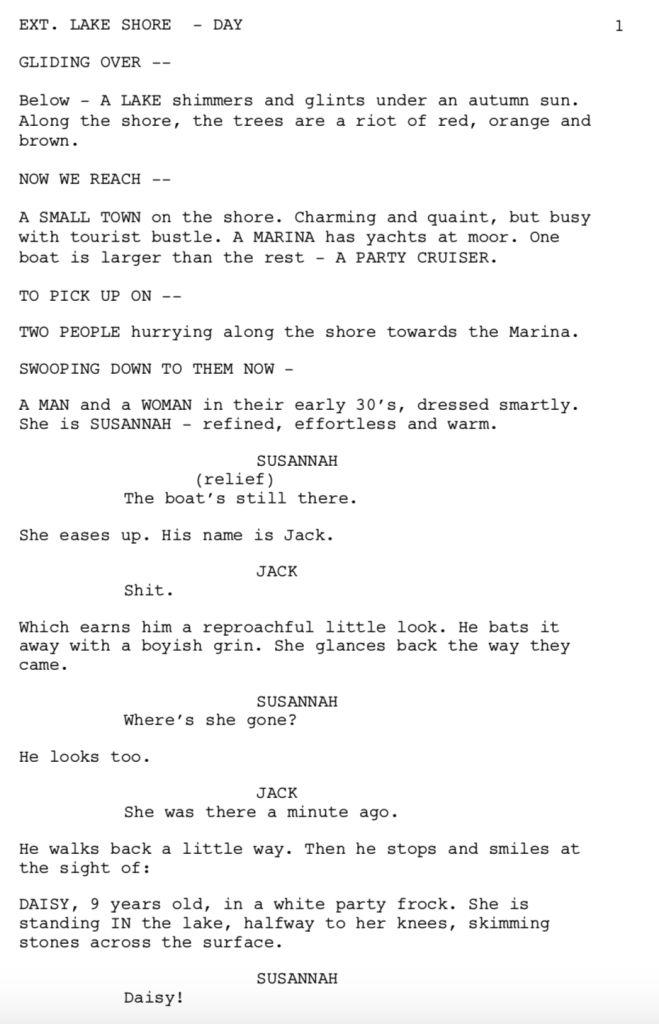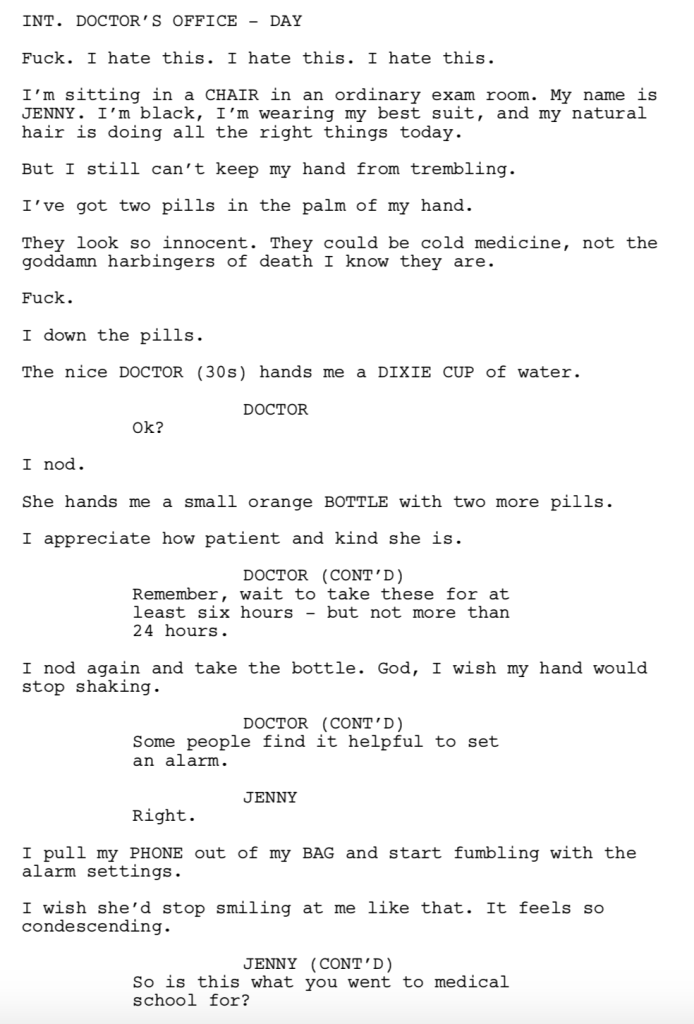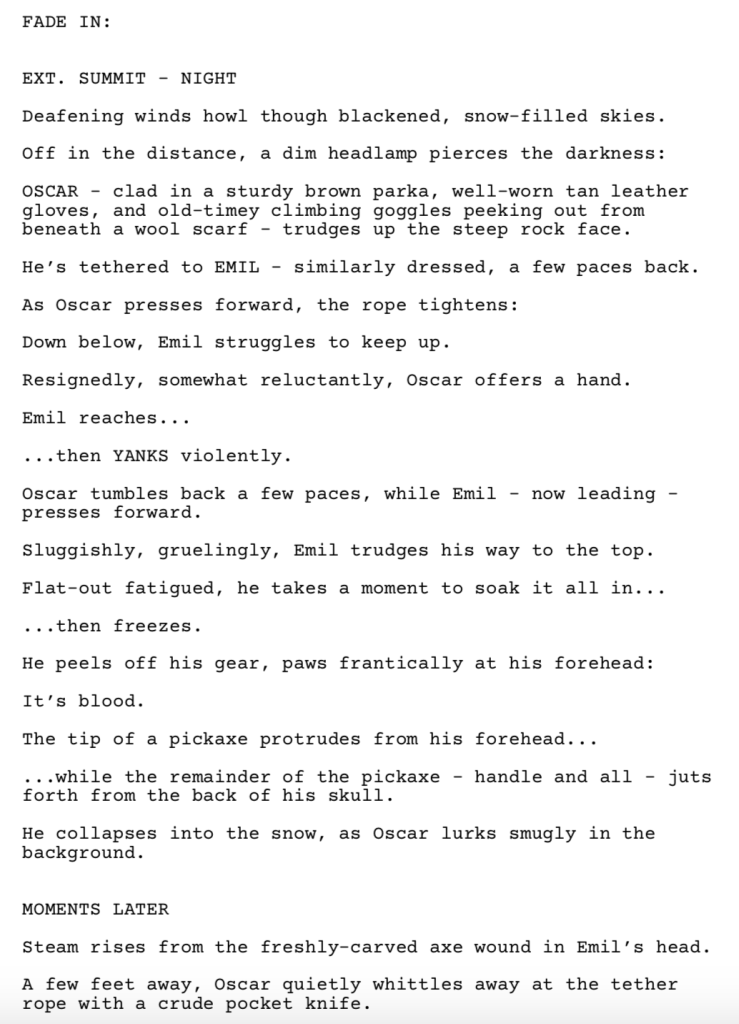Genre: Horror
Premise: When the crew of an oil rig begins to drill on one of the deepest stretches of the ocean floor, they awake a dark and dangerous creature that has been hidden away for hundreds of years.
About: Today’s SPEC script (Yay, go spec scripts!!!) was snatched up by Michael Bay’s Platinum Dunes production company. But the more impressive feat, without question, was making the Black List as a non-biopic. The writer, Nelson Greaves, created the “Unfriended” franchise and was a staff writer on both Sleepy Hollow and 24.
Writer: Nelson Greaves
Details: 120 pages
I was going to do a whole Oscar Theme Week, reviewing big “important” screenplays that exhibited all the qualities of an Oscar contender. But then I thought, “Screw it. Let’s have some fun.” Today we get a classic monster-in-a-box screenplay. For those who don’t know what that means, “Monster-in-a-box” movies are any movie where your heroes are trapped in a contained area with a monster. It is seen as one of the most reliable and marketable movie setups that exist.
David Travis is the captain of an oil rig at the bottom of the sea. We’re told that down here, there is no light. And that, actually, 90% of living things on this planet live in this light-less existence. So it must be a shock to these critters when this crew comes down here and lights up an entire football field worth of sea floor to get their oil rig pumping.
Along with Davis there’s attitude-to-spare, Ox, alternative Chinese-American, Jen, parent of the group, Levan, lesbian, Rae, still acts like he’s in college, Craig, and cowgirl hottie, Anna. After the crew initiates their oil slurping, it’s time for a celebration. But just as corks start popping, the entire rig goes dark. It takes a second for the power to be restored, and once it is, they discover that the lighting system outside has been damaged.
Jen heads out to fix it, but when her toolbox falls outside the lit area and down a small hill, she must retrieve it. There’s only one problem. There’s no light down there. It’s DARK. And they’ve been told never to travel into the dark. Jen’s got beer muscles from the party earlier, however, and heads out. Should we be surprised that she doesn’t come back?
Control Man Craig notices on the radar that Jen is somehow half a mile away. That’s impossible. The rest of the crew throws their suits on and goes after her… into the dark. They get to where Jen’s supposed to be but there’s nothing. “But she has to be there,” Craig pleads. “The radar says so.” That’s when someone realizes, “She’s underground.” They all start digging, find Jen’s arm, pull her up, but her entire suit is filled with guts. Eww. But wait… this isn’t Jen’s suit. This suit is older. Then someone finds a second suit under Jen. These people are not a part of their crew. What’s going on?
Craig relocates Jen’s tracker, which is further away than previously thought. They keep walking and find a giant hole on the sea floor. It appears Jen is at the bottom of that hole. David volunteers to go down, and is slowly lowered via rope. He notices that in the walls of this hole are tons of little tunnels. Who made these? Where do they go? David gets to the bottom and finds a barely conscious Jen. He grabs her and starts back up the hole. And that’s when things get bad. A giant light-sucking beast starts chasing them. It’s able to snatch poor Jen, but David gets away.
Because this beast doesn’t reflect light, the crew realizes that walking back the traditional way is a death trap. There’s no way to see if it’s coming. So they take one of the tunnels and, once below their rig, dig upwards and get back to home base that way. Somehow, this inane plan works, but getting inside the rig doesn’t solve anything. This light-sucking beast is not going to stop until it kills them all.
Fun script desired.
Fun script achieved.
Dark is by no means perfect. The dialogue, in particular, was brutal (DAVID: “Two miles. Jesus. Can you scoot under the engine, check the converter belt?” RAE: “Not for what you’re paying me.” DAVID: “I’m paying you the GDP of Tonga.” RAE: “Which I can’t collect if I’m dead.”). What does that line even mean? What’s Tonga? And how much is their GDP? And since we don’t know either of these things, how can we understand this joke? A classic “camaraderie dialogue” fail, which I’ll cover more in the “What I Learned” section.
But luckily for Dark, the pacing is excellent.
The biggest issue with these monster-in-a-box screenplays is that there’s a lot of sitting around in rooms, gearing up for the next set piece. As that formula sets in (wait around, set piece, wait around, set piece, wait around, set piece), we get used to the pacing, and once the reader gets used to anything, they become bored. After getting out on the ocean floor in Dark, Greaves not only keeps our characters moving, but keeps throwing in unexpected developments as well.
I particularly liked the addition of these tunnels and thought Greaves could’ve done even more with them. If they had to maneuver in and around these things to escape the monster, that would’ve been cool. Making their trek a straight shot back to base was fine, but felt a little ‘first idea’ to me.
This is a great conversation topic for writers. Often what will happen is towards the end of your writing process – your last couple of drafts – you’ll come up with a great new idea. But because you’re basically finished, you don’t explore the idea. I can imagine a scenario where through six drafts in Dark, the hole was just a hole. It was only on the last two drafts that the writer came up with these tunnels. And, unfortunately, two drafts isn’t enough to fully explore how those tunnels could add to the story. Which is why we got this straight shot back to base. (I don’t know that this was the case. I’m only guessing)
If this happens to you, it’s your duty to explore it, even if it’s going to extend your writing out further than you planned. Cause good ideas are hard to come by. And you don’t really get everything out of an idea unless you’ve some spent some serious time with it. There’s a version of this that plays out more like The Descent, where these tunnels lead to a larger truth about what’s living down here. But the writer didn’t go there.
Greaves could’ve also made this much better if he’d taken 5 more pages to set up his characters. These characters are thinner than an electric eel. One character is literally described as “a lesbian.” Lol. As if that tells us everything we need to know about her. I see this a lot in these types of scripts, as writers know the characters are being written to die. “Why spend all this time on setting someone up if they’re just going to die” goes the logic. You should have the opposite mindset. The better we know your characters, the more we’ll care about them. And in cliche setups like this one, good characters are often what separate the winners from the losers.
In order to write memorable characters, start with the basics. Give us a thoughtful character description that lets us know exactly who the person is. Here’s a description of Matt Drudge from the number 4 script on last year’s Black List (“Drudge has a twitchy demeanor and horrific posture. He talks with a weird sense of confidence despite a nasally voice and the occasional stutter.”). Then, ideally, you want to provide an action for that character that further defines who they are. For example, to show that Drudge is annoying, you might have him send back his breakfast at the diner because the eggs are “10 percent too runny.” If you do those two things, your characters will stand out. You still want to give them flaws and vices and inner conflicts. But everything starts with the introduction.
Dark was a good script. It’s a little derivative but it moves quickly and never gets boring.
[ ] What the hell did I just read?
[ ] wasn’t for me
[x] worth the read
[ ] impressive
[ ] genius
What I learned: Try to inject TRUTH into your camaraderie dialogue. Camaraderie dialogue (dialogue between a tight knit group/crew in a movie) is some of the most cringe-worthy dialogue I read. It’s clear the writer has never been anywhere near a military unit, or, in this case, an oil rig crew. So they write some version of camaraderie they saw in a similar movie – in other words, a copy of a copy. Don’t do this. To write good camaraderie dialogue, work off your own life. Think about any time when you and a group of friends were joking around. It’s never perfect. Nobody ever nails that trailer-ready zinger. The conversation is more raw and messy. Start there and try to find the truth of the situation, as opposed to popping in that old Aliens DVD and rewriting the scene after they come out of hyper-sleep.
Oscar Week is upon us. What better way to celebrate than review the film with the most Oscar nominations?
Genre: Drama
Premise: (from IMDB) A year in the life of a middle-class family’s maid in Mexico City in the early 1970s. Inspired by the director’s own childhood.
About: No studio would touch Roma. A black and white passion project without a single recognizable actor and a wandering unconventional narrative? It was as if the director was actively trying to make no one watch his film. However, that director, Alfonso Cuarón, knew Netflix was desperate to get that Oscar and got them to pony up the dough. It worked out for both parties. Cauron got to make his film and Netflix has the movie with the most Oscar nominations.
Writer: Alfonso Cuarón
Details: 2 hours and 12 minutes!
Everyone I’ve talked to who’s seen Roma has had the same reaction. “It was… good,” they say, the way you tell the host of a dinner party their Jamaican-inspired vegan potato salad was good. I’ll never understand the intimidation the average viewer feels to say they liked one of these “important” movies. If you don’t like something, SAY IT. You’re not wrong. We’re all entitled to our opinions.
If it sounds like I’ve got it in for this movie, let me offer some context. I have a huge issue with movies made strictly for critics. Critics aren’t real moviegoers. They don’t have to pay to see films. Movies are supposed to be made for the general population, people who pay. So when you bypass that demographic for the sole purpose of winning an award, I have no respect for you because you don’t have any respect for me. I’m a pawn being used for your awards speech.
Roma is the most relentless version of this. It is a movie that, literally, does not need an audience. It didn’t have a theatrical run so no one needed to see it. It was thrown on Netflix where, maybe, 12 people watched it all the way through. Didn’t matter. All that matters is that Netflix gets one of those gold guys.
I’ve personally attempted to watch this film half a dozen times. Every time I’ve fallen asleep within half an hour. So I drank a gallon of Coke and injected adrenaline directly into my veins, Crank style, this time in an attempt to make it through all 132 minutes of this overpriced sleeping aid in order to give you a definitive review. Let’s take a look…
Cleo is a maid. I know this because the first 30 minutes of this movie shows her cleaning the house. Eventually we learn that this is a middle class home in Mexico City at some point in the 1970s. Cleo’s love life begins to heat up when she meets a local guy who’s really into doing karate movies while naked. After the two sleep together, karate guy disappears.
Meanwhile, we spend more time in the home. More cleaning. More hanging out with the kids. More playing on the roof. More cleaning. More turning off lights. More cleaning dishes. More shots of sinks. More cleaning. More washing clothes. There’s some cleaning. Cleo and the other maid busts each other’s balls while cleaning. More drying clothes. And every once in awhile we get a very long scene of the husband or wife attempting to park their giant car in their very tiny garage. If they’d gotten rid of these scenes alone, the movie would’ve been half as long.
One day, the husband tells the wife that he’s leaving for work for several weeks. After this enormous bombshell of a plot point, we spend a lot of time either sight-seeing downtown or going out to the Mexican countryside. What these scenes have to do with the story is anyone’s guess. Might they be an excuse for some Oscar-worthy cinematography? Anyway, it eventually becomes clear that the husband isn’t coming back. Poor wife.
Meanwhile, in the other giant bombshell plot development, Cleo is pregnant! Oh no! Oh no indeed as we realize we need to spend 9 months with her to get to the end of this movie. And that’s exactly how long the rest of the movie feels. It wanders aimlessly, looking to fill in time before the climactic labor can occur. Cuarón even throws in some random riots in order to make the film look like it had a point. It didn’t. Lucky for us, the movie gives us a feel-good winner of an ending. Cleo’s baby is stillborn. Fin.
“Serious” filmmakers who care about the audience understand that storytelling is a compromise. They tell their meaningful story (the selfish part) but do so inside an entertaining package (the selfless part). Take District 9. Blomkamp wanted to say something about racism in South Africa. Did he give us a boring literal story about racism in South Africa? Of course not. Nobody would’ve watched it. He told the story through the lens of an alien arrival, using the aliens as stand-ins for the oppressed race. Not only is that WAY more effective at getting the message across, but it’s more entertaining as well.
Roma is a long dull achingly literal look at a family going through tough times. And I use that term (tough) loosely. The one thing I was looking forward to in this movie was the riots from the trailer, as they implied the movie was about something bigger. But the riots are tacked on. They don’t have anything to do with the plot. This movie comes down to two plot points – Cleo’s pregnant and the father leaves. That’s the only dramatic value you get for your two hour and 12 minute investment.
There are a select few times where these storylines resonate. It’s hard not to feel for the wife when her children spot their father running out of a movie theater with another woman after not seeing him in months. But here’s the problem. This movie is so set on being artsy (most of the film is shot like a fly on the wall, a 70s black and white Fellini version of a reality show) it forgets to do the basic things, like introduce us to characters so we KNOW THEM. I never got a single scene that featured the kids. They were always running around in the background. So how bad am I going to feel for them when their dad leaves? It’s more of a general feeling of sorrow. Like, “Man, that sucks.” It’s not that deep empathetic heavy feeling you get when a character you’ve gotten to know intimately experiences a loss.
Cuarón cares more about recreating time and place than he does these characters. We often find ourselves in random parts of the country (one day we’re on a river with a bunch of suburbanites shooting guns into the wilderness for no other reason than I assume it’s something Cuarón remembers happening as a kid). And while there’s no denying that Cuarón is a masterful filmmaker, the images are devoid of the emotion they so desperately want to convey. Why? Because there is no narrative here and no attempt to get to know these people. It is a specific person’s experience that is only meaningful to him as only he knows who these people are and how they affected him. When a blond haired Netherlandian man starts singing a sorrowful song while hundreds of locals attempt to put out a fire, I nearly yanked the wires out of my TV, ripped it off the wall, stormed up to my roof, and threw it into the street.
If you’re a cinematography geek or like foreign films with zero plot, check Roma out. There’s plenty to marvel at. But let’s be real. As a screenplay, this is an unmitigated disaster. There is no semblance of a narrative to even begin judging what’s happening storywise. It’s random, it’s pointless, and it’s boring.
[x] What the hell did I just stream?
[ ] wasn’t for me
[ ] worth the stream
[ ] impressive
[ ] genius
What I learned: There’s an old saying in writing – “No one cares about your boring life.” Everybody thinks their life is somehow worthy of a movie. If you haven’t been president, didn’t become a rags to riches success story, or weren’t involved in a national scandal, chances are your life isn’t worth telling onscreen. That doesn’t mean you can’t write about your life. You just need to find an exciting concept then subtly fit pieces of your life into the characters and events. A maid’s boring everyday life isn’t worthy of a movie. It just isn’t.
One of The strangest things I’ve encountered Lately is writers Capitalizing random words that Shouldn’t be Capitalized. This occurs, on average, once every eight submissions. Come on, guys. This is a writing website. If you don’t know how Basic capitalization works, why are you Sending in entire Screenplays? Learn the Basics. Such as How to write a sentence that doesn’t have any errors in it. Then we can talk about writing 110 page stories. When I go through these submissions, it’s an exercise in head-shaking. I’m rooting for everyone here but if you can’t even survive your pitch without making half a dozen grammar mistakes, there’s not much I can do for you. If you don’t know what should or shouldn’t be capitalized, ask for help in the comments section. There are plenty of people who will be happy to help you.
Despite this gripe, I’m excited about this week’s entries. We’ve got a couple of kick-ass writers whose work I’ve read before. We’ve got high concepts, on-trend material, and some solid thriller ideas. Who will win it all? That’s up to you to decide. Amateur Offerings is a mini screenplay tournament where you read as much of each script as you can, then vote for your favorite in the comments section. Whoever receives the most votes gets a review next Friday. If you’d like to submit your own script to compete in a future Amateur Offerings, send a PDF of your script to carsonreeves3@gmail.com with the title, genre, logline, and why you think your script should get a shot.
Good luck to all!
Title: 1888
Genre: Action/Fantasy
Logline: In 1888, an ex-cop seeking to unravel the mystery of his daughter’s death is recruited into an organization dedicated to protecting London from fantastical evils. As our hero hunts for answers, Jack the Ripper commences his reign of terror with an apocalyptic plan that transcends murder. Men in Black meets the Victorian macabre as the fate of the world hangs in the balance.
Why should you read: Big, fun and very R-rated, I’m the first to admit my chances of getting this thing made are bleak. Still, it’s a total passion project and I genuinely believe one that readers (especially those with a proclivity for action and the supernatural) will dig. Plus, London in the 1800s! That’s a pretty fun time, y’all (well, for readers of scripts, not the poor people who actually lived then. Seriously, my research indicates it fucking sucked).
Title: Cold Feet Wedding Insurance Project
Genre: Romantic comedy
Logline: After he insures an extravagant wedding against “cold feet” for a million dollars and the bride-to-be falls for him, a conniving insurance agent must get her to the altar, or the claim will bankrupt his ailing boss/father’s modest insurance company.
Why You Should Read: I came across the idea for this script when I was planning my wedding and researching all things wedding. I couldn’t believe it when I “ran” into a site that offered Change of Heart insurance. I thought that was a great kernel of an idea for a rom-com, and thus was “Cold Feet Wedding Insurance Project” born. If you like stories packed with irony, stakes and enough twists to make a Twizzler jealous, you should enjoy Cold Feet Wedding Insurance Project. — In advance, a big thank you to those of you who read any of the script, and a massive one if you vote for it!
Title: REDWOOD
Genre: Psychological Horror
Logline: After her child is killed, a woman becomes convinced that her husband and her neighbours were responsible. Is she being driven to paranoid madness by her grief or is the horror real?
Why You Should Read: I’ve always enjoyed a story that takes you inside a character’s mind and whips you along on a journey with them, where you don’t know what’s real and what isn’t and are kept guessing until the end. I wanted to see if I could write one of those. I also wanted to see if I could take a classic story – one of Carson’s favourite movies – and put a spin on it to make it mine. Maybe I have, maybe I haven’t. Only one way you’ll find out.
Title: The Dirty Work
Genre: Dramedy
Logline: A blackballed entertainment lawyer puts her negotiation skills to the test when her beloved oldest daughter announces that she’s putting off college to become a feminist porn star.
Why You Should Read: This script examines just how messy and complicated modern feminism can be when ideals get translated to real life. The story is personal and timely and incredibly important to me. I think it will elicit strong reactions — both positive and negative — and it would be invaluable as I continue to develop this story to hear a variety of takes from readers male and female, young and old — not just Carson. (I’m saving my cash for a private consultation on my next script :) ) Bonus: At 89 pages with a lot of white space and humor, it’s a very fast read.
Title: DEATH ZONE
Genre: Psychological Horror-Thriller
Logline: When a novice mountain-climber embarks upon a treacherous, flurry-filled trek up one of the world’s tallest peaks, he soon realizes that the only thing more dangerous than the mountain he’s climbing is the deranged psychopath he’s climbing it with.
Why You Should Read: ‘Death Zone’ is a term used by mountain-climbers to describe high altitudes where there is not enough oxygen for humans to breathe (typically above 8,000 meters or 26,247 feet). Visitors to the death zone become weak, have an inability to think straight, and struggle making decisions – especially under stress. Most of the 200+ climbers who have died on Mount Everest have died in the death zone. My script, DEATH ZONE, is heavily inspired by movies like ‘The Shining’, where the real villain isn’t the supernatural spectres or scary things you see; but rather, the setting itself, and what it’s doing to those inhabiting it (and the subsequent risk posed to others sharing that space). Victor Miller (writer of Friday the 13th) called it a “helluva screenplay”, and a “wonderful hell on a mountain”. Hope you enjoy!
Ever since the beginning of the First 10 Pages Challenge, a segment of commenters have expressed doubts as to its purpose. They argued that capturing a reader from the very first word, then using each successive sentence to keep them invested is not only difficult, but unrealistic for every type of story (particularly non-genre stories). One of the more prominent arguments was that the first act is used to set up the characters and the plot so you can use the rest of the story to entertain the reader. Let us not forget, they point out, that the best action-thriller of all time, Die Hard, starts with a run-of-the-mill landing at LAX.
They further argue that the best scenes require an adequate amount of setup. You can’t place that rooftop scene in The Shawshank Redemption at the beginning of the movie, just as you can’t start Star Wars with the trash-compactor scene. It takes getting to know all the characters in that scene, learning about the Death Star, creating a scenario for us to get into the Death Star, saving the princess, trying to get out of the Death Star, before we can appreciate what’s going on and what’s at stake.
BUT if you’re using that as the reason why you don’t have to hook the reader right away, you’re sabotaging your screenplay gains. Let’s not forget that Star Wars begins with a pretty awesome scene – a giant ship overtaking a smaller ship, then invading it to capture the plans that the crew stole. The reality is, if you make it a priority, you can come up with a great first 10 pages for any type of story. You just have to adjust which tools you use. For an action script, it might be something action-y. If it’s a drama, you might use suspense, surprise, or dread. Hell or High Water is a relatively slow drama and it stats with a bank robbery. A Quiet Place has a great first scene where a family has to grab some things from town without making any noise. “But Carson, that’s a horror movie so it’s easier to write a scene with a hook.” I can’t tell you how many horror scripts I’ve read where the writer started with something mundane or boring. They could’ve easily taken this route in A Quiet Place and used their first 10 pages to set up the farm. You always have a choice. For every mundane scene you write, there is a suspenseful entertaining scene out there you could’ve written.
And while the focus for this challenge has been on the first 10 pages, I’m trying to teach you a bigger lesson here, which is that when push comes to shove and you need to write a great scene, you’re able to, regardless of where it is in the script. Most writers are unable to do that. They don’t understand what makes a scene work. They don’t understand basic storytelling principles like In media res, goals, obstacles, creating sympathetic characters, different types of conflict, dramatic irony, creating a problem that the audience wants to see the hero solve, suspense, mystery. Then taking those ingredients and giving us something either really well executed or unexpected (preferably both). If you want to watch a scene where the writer has all of these working, watch this short film.
But the most important reason you should aim to hook the reader right away is that you’re an unknown spec screenwriter. Nobody knows you. Nobody cares about you. The only thing you have to get peoples’ attention is the written word. So why risk boring these people with a slow or weak opening? Some of you will say, “Well if a reader is tasked with reading your script, they’ve got to read past the opening anyway. So what does it matter if you hook them on page 1 or page 15?” This is a common misnomer. A reader may be tasked with reading your script. But a lot of readers will decide early on whether a script is worth all of their attention or some of their attention. And most scripts fall into the latter category. So if you don’t hook them right away, there’s a change they’re reading your script half-heartedly. And that doesn’t even take into consideration what happens when the script gets passed up to the more important person (agent/producer/director). They owe you nothing. They can stop reading on page 2 if they want. And they do. Will Smith is notorious for giving a script five pages. If he likes those five pages, he gives the script five more. And as soon as the script gets boring, he stops reading. A lot of people in the industry are like that because they don’t have enough time to get through everything.
Where does that leave us today? Well, if there’s one thing I realized about this challenge, it’s that it’s hard to write a great scene. Especially the first scene of the movie, when we don’t know the characters yet. Sure, I can say, “Scream did it.” But Scream has one of the best openings ever. So it’s unrealistic to ask for that every time out. But there were two scripts (so far) that got me to read all ten pages (last entry here, and last entry here). And while neither of them were anywhere close to Scream-level, they both had something in common. And this is the big lesson I want you to take from today’s post: THEY DIDN’T GIVE ME A REASON TO STOP READING.
Let’s unpack that. The pages weren’t world-killers. The scenarios weren’t “oh my god” captivating. But they were interesting enough and the writing was easy enough to read that I kept reading. With all the other entries I bowed out of within 3 pages, it was torture reading them. Either I was confused, the scenes were overwritten, the setup was cliche, the setup was uninteresting, the writing was clunky. I was constantly given reasons TO STOP READING. So yes, I still want you to aim to hook the reader immediately. But, as a backup, you shouldn’t give us any reason to stop reading.
Assuming you’re dropping us into a situation that’s interesting (a scenario that has some level of drama and intrigue), here are three things you can do to make things as easy on the reader as possible. If you break any of these, you are giving the reader a reason to stop reading. That’s BAD.
1) Don’t be artsy and weird – You’re not trying to impress English professors. You’re trying to hook the reader. Too many writers think they have to be artsy and quirky with their opening. They must show the reader that they’re a “Writer” with a capital “W!” Just tell us what we’re looking at, dammit.
2) Keep your sentences (and your paragraphs) short and simple – No SAT words. No run-on sentences. Stay away from extraneous or unimportant information. Keep things short and to the point. In screenwriting, you’re trying to say as much as possible in as few words as possible. Nowhere is that more important than the first 10 pages.
3) Be clear – To bestow upon the abject redundancy of these rules, try retaining your core objective, the flaw that dictates where and how you resolve the early plot beats. If you read that sentence and said, “Um, what?” welcome to my biggest pet peeve – LACK OF CLARITY! The second I’m unclear about something, I’m out. After you write anything, put yourself in the eyes of the reader, read it back, and ask if what you’re trying to say is clear – as in, it can be understood by a 6th grader. If it isn’t, rewrite it until it is.
Carson does feature screenplay consultations, TV Pilot Consultations, and logline consultations. Logline consultations go for $25 a piece or 5 for $75. You get a 1-10 rating, a 200-word evaluation, and a rewrite of the logline. If you’re interested in any sort of consultation package, e-mail Carsonreeves1@gmail.com with the subject line: CONSULTATION. Don’t start writing a script or sending a script out blind. Let Scriptshadow help you get it in shape first!
Today’s writer has come up with a rather clever pitch: “Bizarro World Jerry Maguire.”
Genre: Sports/Drama
Premise: Atticus Archer is college football’s version of a fixer. As he juggles chasing the nation’s top prospect, a mental breakdown from a star quarterback, and his own personal demons, an NCAA agent arrives on campus to threaten everything.
About: Today’s writer comes from my home town, Chicago (“Daaaaaa Bersh.”). He got this script out there, presumably through his manager (Alex, if you’re out there, can you confirm this?), which secured him representation at one of the top agencies in town, UTA. It has since landed on both The Black List and The Hit List. Speaking of Chicago (and because we were talking about LA’s best fries yesterday), here are the 14 best hot dogs in Chicago, ranked.
Writer: Alex Convery
Details: 119 pages
Let me propose a business model for you. You create a product that generates 1.5 billion dollars in revenue a year… yet you don’t have to pay your workers a dime. Welcome to NCAA football, the most clever scam in sports. Unlike professional football, where you’re giving players hundred million dollar contracts, college football players are deemed “amateurs.” Therefore, they can’t be paid. How unfortunate for those poor colleges. It’s not that they WON’T pay them. It’s that they’re NOT ALLOWED to.
Colleges making billions of dollars off athletes is one of the more interesting conversations going in sports today due to the complexity of the issue. There are some people who say, “Well, they’re getting a 100,000 dollar education for free. So they ARE getting paid, just indirectly.” But if a school is making 150 million dollars off their athletics each year, as a college like Texas A&M is, and that money is being made exclusively because of those athletes, isn’t 25 thousand dollars (a year of scholarship money) a joke?
However, if you believe in paying athletes, how in the world do you do it? A big college may have 30 sports programs. So does every athlete get paid evenly? Or is it done on a sliding scale? And if you have a sliding scale, is it a sliding scale based on the sport, or is it a sliding scale within each sport? A third-string right tackle isn’t nearly as important to a team’s success as the star quarterback. So would they get paid the same? If not, who deterines how much each athlete in each sport at each position gets paid? That seems really complicated. And we’re just talking about the big programs. What if you’re a football player on Tarleton State University where 500 people show up for a Saturday game? Do those students get paid the same amount as the players at Texas? Does the state redistribute funds so everyone gets an equal share?
This is why the NCAA has been able to get away with this for so long. Coming up with an alternative is impossible. Which segues perfectly into today’s script, which examines one of the most important cogs in the college athletics machine – the bag man.
Atticus Archer is 55 years old and ready to retire. Atticus is a “bag man” for Auburn University. In order for colleges to land top-rated high school athletes, they have to pay them. But paying athletes to come to your school is illegal. This is where the bag man steps in, an “independent” agent who unofficially goes to athletes’ homes, gets them to commit to their college, then instructs them where to find a bag, which will, of course, be full of money. If the university were to ever be investigated for paying athletes, it’s impossible to convict them because the bag man is working on his own accord.
We meet Atticus as he tries to convince the best high school quarterback in the country, Ricky Patterson, to switch his commitment from Alabama to Auburn. What Ricky and his father don’t know is that before Atticus showed up, he leaked e-mails showing Ricky’s dad ask for money from Alabama. Just like that, Alabama is out. And who’s there to pick up Ricky and dust him off? Auburn, of course.
Atticus heads back to Auburn where he focuses in on one final recruit, a ginormous freakish defensive lineman named Chance Fluker. Once he gets this dude to commit, he’s officially done. But when he heads to Fluker’s home, he learns that his mother won’t be easily swayed. Unlike the typical mega-athlete families that dream of their big payday, Miss Fluker has actual morals. And she’s not giving those up for a bag. This one, Atticus realizes, is going to be tough.
Meanwhile, the strange circumstances surrounding Ricky Patterson’s sudden switch from Alabama to Auburn has the NCAA suspicious. So they send over Thomas Kendrick, a former star athlete turned agent for NCAA’s investigation unit. Kendrick is tasked with going down to Auburn and figuring out what happened. As soon as Atticus meets Kendrick, he knows he’s no joke. But Atticus’s ego ensures that business will continue as usual. It’ll be up to Kendrick, now, to catch him in the act.
I would re-title this Mixed Bag Man.
It’s a solid read but every time it’s about to get good, something pulls it back. Like a talented quarterback with a penchant for throwing interceptions. You march us 70 yards down the field and then it’s wasted on one bad throw.
The cool thing about Bag Man is there isn’t anything else like it on the market right now. I don’t read many scripts about college football. And I’ve definitely never come across a script about a bag man. To top it off, Convery creates this mano-a-mano clash between two alpha dogs, which makes this feel like the sports version of Michael Mann’s “Heat.” That’s a winning formula right there.
Unfortunately, Bag Man feels like a script destined for an 8-3 season, good enough for a bowl game, but not good enough to get to the championship. Take this battle between Atticus and Kendrick. It’s way too one-sided. Atticus gets 4 times as much screen time, and Kendrick never makes enough headway in his investigation to be a true threat. For these movies to work, we have to feel like the hero is genuinely in danger. If the audience doesn’t believe they have a chance of losing, where’s the tension? Where’s the fear?
Speaking of, the stakes are way too low. What happens to Atticus if he gets caught? He’ll be scolded. He’ll lose his job. But he’s retiring at the end of the year anyway. So is losing his job a few months earlier than planned that big of a deal? Compare this to the stakes in Jerry Maguire. Jerry’s got one client, Rod Tidwell. The two are playing through the season, betting he’ll play well enough to land a big contract. If that doesn’t happen, Jerry loses his business. He loses everything. That’s the best version of “high stakes” you can create – if your hero doesn’t succeed, THEY LOSE EVERYTHING. That was far from the case here.
And it was such an easy fix. Insert a scene where a friend tells Atticus that they’re coming after him hard. “They want to make an example of people like you.” So they’re going to put him behind bars for as long as they can legally get away with. Now something’s on the line.
Another issue I had is I was never clear why Atticus was doing this. Another character even points this out to him – when Auburn wins, the players get the glory, the coach does, the school does, even the students do. But nobody knows who Atticus is. No one will ever cite his name when it comes to the school’s success. So why does he do it? That’s an important question and we never get an answer. We needed that answer.
Despite these issues, the script moves along quickly. Atticus is an active character. And for those of you new to screenwriting, that means he’s a character with a strong goal (he wants to sign Chance Fluker). Strong goals require your hero to act, to go after things, and that’s where you find the drama, in the “going after” part. Because there will always be obstacles getting in the way of that goal and the audience will be curious how our hero will overcome those obstacles. Bag Man actually takes it one step further. In addition to going after Chance, Kendrick is closing in on him. So you have him fending off obstacles both in front of and behind him.
I just wish it felt more important. Figure out the stakes, figure out why Atticus is doing this, and you have a winning script.
[ ] What the hell did I just read?
[ ] wasn’t for me
[x] worth the read
[ ] impressive
[ ] genius
What I learned: Have your writing style match your subject matter and hero. At first, I was annoyed by the writing style in Bag Man. It was one of those scripts with a lot of underlining, ellipses, bolding, excess capitalization. But the further I got along, the more I realized our hero (as well as the subject matter) was big, arrogant, and showy. So the writing style ended up fitting. You wouldn’t use this writing style on a script like Roma. But for Bag Man, it was perfect.



